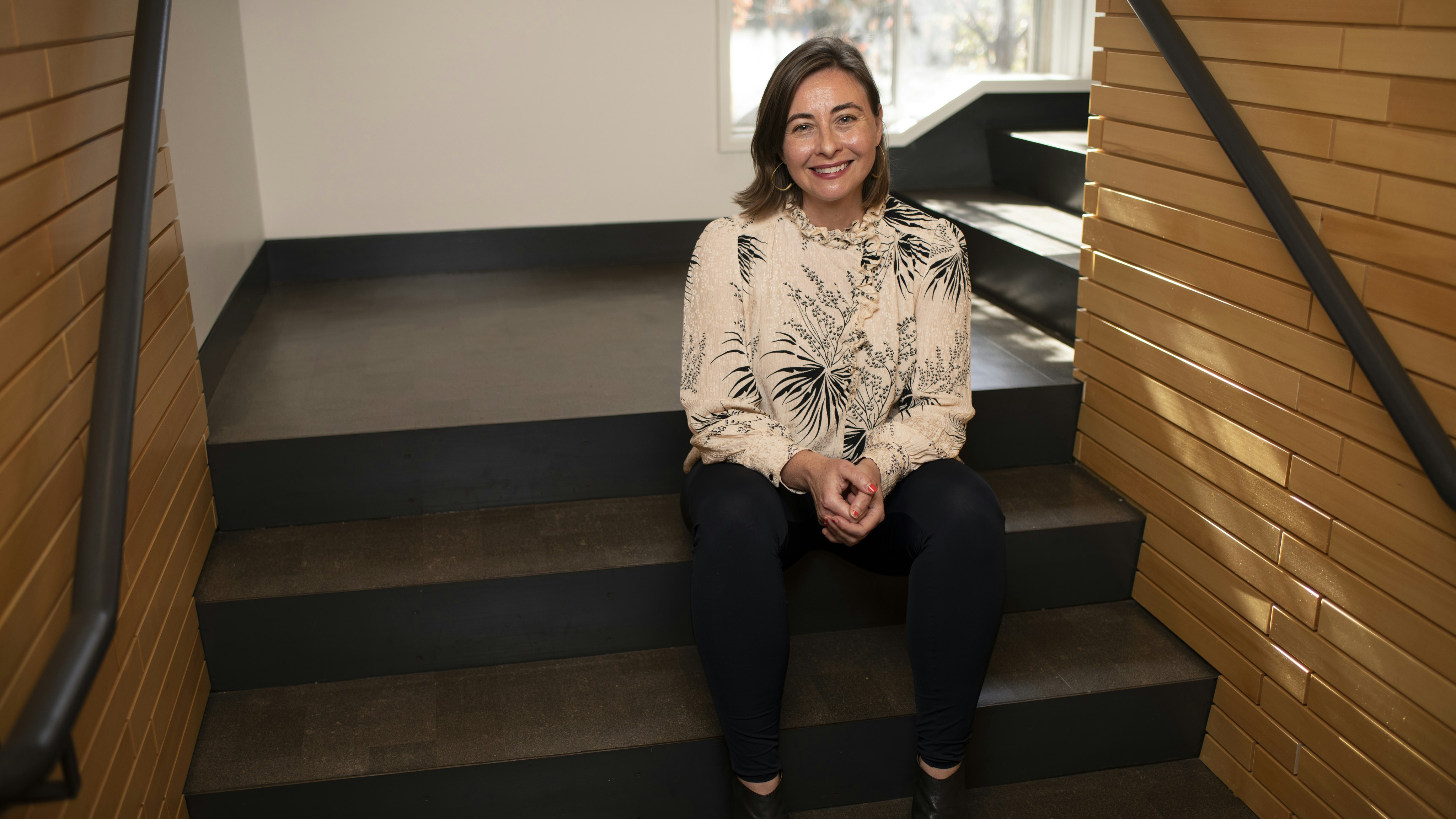On the Road to a PhD, Many Twists and Turns

Libusha Kelly has long been a woman in STEM—but her path to microbial ecology is not what you might expect.
Growing up in Queens, a teenage Libusha Kelly took a job at the New York Aquarium. She wanted to be a whale trainer, and as a summer docent at the aquarium, she took care of beluga whales. She also worked at the shark tank—there, she wore a T-shirt that read “Sharks? Ask Me!”
Were the microbial ecologist to wear such a shirt today, it would bear a different message: “Vaginas? Ask Me!” Kelly, now the 2021–2022 Hrdy Fellow at Radcliffe, is studying the makeup of the vaginal microbiome in hopes of developing more personalized treatments for gynecological disorders such as bacterial vaginosis.
In 2013, Kelly’s lab at Albert Einstein College of Medicine, where she is an associate professor, began to study the gut microbiome—specifically the role of microbes in how the body metabolizes certain drugs—before broadening that work more recently to that of the vaginal ecosystem. “When I talk about the gut microbiome, people want to tell me about their digestive lives,” says Kelly. “They’ll give me their confidential health information immediately: ‘Is it normal to poop three times a day?’ or ‘I was diagnosed with IBS.’” The vagina? Not so much.
After Kelly delivered a talk about her work to her fellowship cohort, another fellow sent her an advertisement for a yeast infection treatment that featured a woman with a singing crotch. It features the tagline Joie de Hoohah. “We treat the vagina as something either gross or funny—there isn’t the same kind of engagement as with the digestive tract,” she says. This is something she wants to address through her current research, which she hopes will make the topic of the vaginal microbiome less taboo.
As much as Kelly loves her work, her path to basic research was anything but direct: “I have a bit of a weird background,” she says.
Kelly began her studies at Stanford University’s Department of Biology, but, disenchanted by its pre-med focus, she switched to the Program in Human Biology. At the same time, to support her college experience, she was working a number of jobs, including in the Department of Medical Genetics at Stanford Hospital. She thought she might want to become a genetic counselor and began considering a PhD in science. “The thing that really stopped me from doing that straight out of college was that I hated school,” says Kelly. “It was not a good fit for me.”
Kelly found that the best-paying jobs out of college had a computational element, so she set her sights on learning to code, eventually landing a job as a web developer at Stanford. But biology would come knocking once again. While posting jobs in the course of her work, Kelly was lured by an exciting listing: the relatively new Human Genome Project was looking for someone to do computational analysis of DNA sequences.
Despite not having any experience in bioinformatics, Kelly applied for the job. “Look, I don’t know any of this, but I am a quick study,” she remembers telling them. “I will spend all my time here. I will learn how to do it, and you will be super happy that you hired me.” They took Kelly at her word, introducing her to large-scale genetic and genomic sciences.
“And I really loved it,” she says. Her colleagues urged her to earn a PhD. “But they didn’t understand—I took this job because I didn’t want to be in school,” she says with a laugh.
When the Human Genome Project concluded, she returned to Stanford to work in IT—but it no longer held its previous allure.

"Science is a creative process, so it’s never one-size-fits-all," says Kelly of her chosen field.
“I missed the science, I missed all of it,” says Kelly. “So I said, ‘Okay, you win. I’ll go back.’” Based on the papers from the Human Genome Project, she was admitted to the University of California San Francisco, where she studied human genetic variation in drug transporters, and how that might influence how different people respond to the same drug.
Kelly emphasizes that the decision to continue her science studies wasn’t an easy one. “For me, it was taking a massive pay cut,” she says. “But I thought, ‘I am going to try this out, and if it doesn’t work, I will go back and do other stuff.’ And I guess I still feel that way.”
Fortunately for basic research, the science thing has worked out for Kelly. Four years as a postdoc in Penny Chisholm’s lab at the Massachusetts Institute of Technology, where she studied ocean bacteria and viruses, prepared her for her current work with microbial genomes—which, she points out, are quite different from the eukaryotic, or human, genomes.
“From there, I decided I wanted to try to go back and ask that question about drugs and microbes in the human body,” Kelly says.
Now, leading her lab, her enthusiasm for science has not waned. If anything, that enthusiasm now drives her desire to make basic scientific research more inclusive—a desire born of the experiences from her labyrinthine career path.
"I love being a scientist, and I want people to know that there are many different paths to a career in science—you don’t have to go straight from college to a PhD in a research lab,” says Kelly. “Science is a creative process, so it’s never one-size-fits-all, and maybe that’s why there are so many different ways that scientists try to serve our world. And our world needs more scientists, especially now.”
Read about Libusha Kelly's research on the vaginal microbiome.
Ivelisse Estrada is the acting editor of Radcliffe Magazine.







